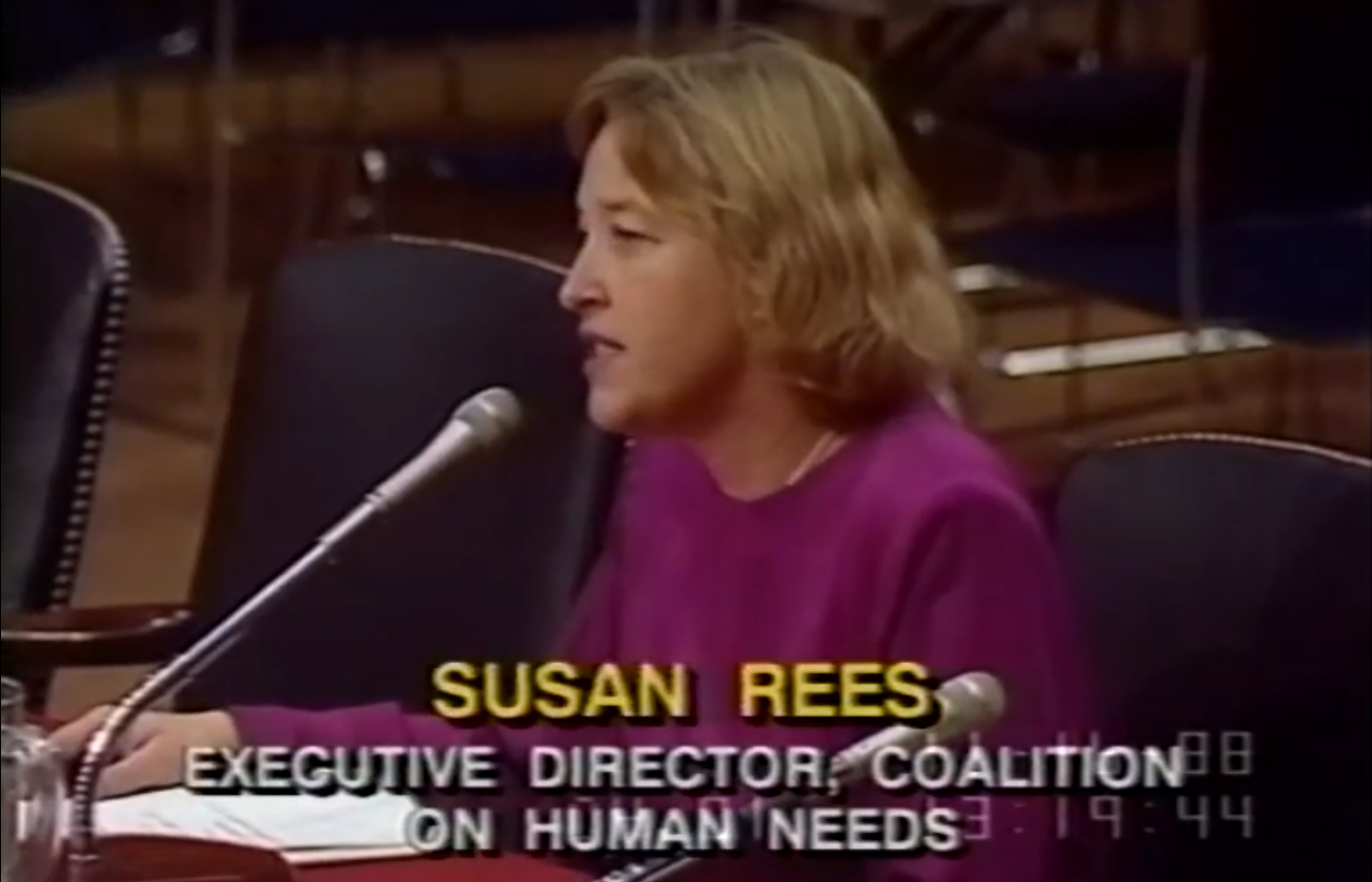
Remembering Susan Rees
Susan Rees passed away on February 1. At this sad moment, we at CHN celebrate Susan’s vision and strength, and rededicate ourselves to further her work.
Susan Rees helped to build the Coalition on Human Needs into an organization that has endured, committed to reducing economic injustice and poverty. As Executive Director from 1983 to 1991, Susan strengthened a coalition of faith groups, labor, policy experts, service providers and civil rights groups to fight against the Reagan Administration’s efforts to weaken the federal role in helping low-income people and protecting against racial discrimination. I’ve been leafing through old CHN documents, and it’s striking how many people from CHN’s member organizations were doing the work of the Coalition – drafting position statements, working on press events, and building ties to state groups. Susan was supporting the work of a real coalition – one whose members provide staff time towards shared goals.

“Deficit Reduction & Its Implications” hearing at the National Economic Commission – Nov 16, 1988
Today, when CHN is at its best, it follows Susan Rees’s example. Our biennial document setting out Public Policy Priorities, for example, comes from the work of close to 100 people from CHN’s member organizations. CHN learned the importance of active inclusion from Susan.
Susan brought key organizations together in support of basic shared values: a nation in which the federal government protects and meets the needs of low-income people. Then as now, protecting low-income people had to be a federal role, since some states or localities either rejected most help for the poor or acted to discriminate against people of color in distributing aid. Susan led the Coalition in opposing the Reagan Administration’s efforts to weaken the federal role and to cede authority to states. In one instance in 1984, CHN (then known as the Coalition on Block Grants and Human Needs) uncovered from anonymous sources a Reagan plan to let state agencies investigate civil rights complaints under block grants. The files show that Susan forwarded this “foxes guarding the henhouse” plan to a New York Times reporter and, working with CHN members, organized opposition.
Under Susan’s leadership, CHN reached out to forty state groups for work together to demand just federal policies. Of central importance, she worked on a report, How the Poor Would Remedy Poverty, based on more than 200 interviews with low-income people in 1986. You can download a PDF of the report here.
Another lesson for all of us today: Susan knew that for CHN to work on the right priorities, we must be grounded in knowing what is important to the people directly affected. Then as now, low-income people were calling for living-wage jobs, economic development in their communities, education and training, and adequate public assistance programs when people cannot work.
Susan Rees continued her advocacy for decades after leaving CHN, always centered in work to alleviate poverty, focusing on housing and the needs of women and their families. Throughout, she continued her efforts to build ongoing advocacy, knowing that the vital tasks before us are too big for any one group to tackle alone.
Susan Rees could not build a coalition that once and for all would end the injustices and threats to the poor. No one could, because the people and systems that benefit from maintaining a choke-hold on the aspirations of the poor and of communities of color endlessly seek new ways to expand their advantage. What Susan did was to build an ongoing effort that would be around to fight back. We are extremely grateful that Susan’s wife and partner of 29 years, Polly Donaldson, has suggested if people want to make donations in Susan’s memory, they consider giving to the Coalition on Human Needs. In Susan’s memory, we rededicate our work to bring together a diverse and powerful legion of advocates who understand how high the stakes are: that our nation’s future depends on securing economic justice.

